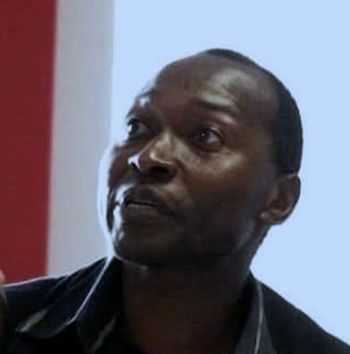Brian Muziringa

Thumbnail: Brian Muziringa, born with a disability and later forced to leave his country because of political and economic turmoil, uses environmentally sustainable strategies to promote the rights of immigrants living with disabilities in South Africa. In 2012, Muziringa formed the Disabled Migrants Rights Networking Organisation, which seeks to stand in solidarity with people living with disabilities and to establish avenues for their inclusion. Muziringa’s work is not without hazards: By challenging exclusive policy and xenophobic practices by extremist groups, he exposes himself and his workmates to possible violent attacks. But Muziringa is committed to his path, envisaging a world that values peoples’ dignity and human rights, as well as more inclusion for those living with disabilities.
Profile: Brian Muziringa has used artificial legs since childhood. Born in Zimbabwe, he left in 2001 at the height of political and economic turmoil and moved to South Africa.
When Muziringa arrived in South Africa, he realised that “It was difficult to access social security support and health subsidy for people living with disabilities, as enshrined in the country's progressive constitution under the Bill of Rights Chapter 2, due to lack of implementation of the Refugee Act of 1998. Unfortunately, there were interpretation challenges from different sectors leading to institutions’ discrimination of vulnerable groups seeking services support. The encountered problems inspired me to start a faith-based movement, which assured my initiative platform to do advocacy work, and lobbying for inclusiveness using various platforms created by religious leaders.”
On realising the challenges that disabled immigrants (as well as locals) faced, Muziringa formed the Disabled Migrants Rights Networking Organisation as a way to help them combat discrimination and exclusion. The group represents immigrants, refugees, and others with disabilities, including visual and hearing impairments and albinism. It also offers support to people who have experienced police brutality. Muziringa and his colleagues “conduct advocacy, lobbying, and outreach within communities to raise awareness about migration and its ‘push and pull factors’ and to explore personal stories of migration towards building human rights education . . ..” The goal is to provide education concerning the social, economic, and human rights of people, particularly migrants and those living with disabilities. To that end, Muziringa advocates for “policies that promote the dignity of disabled migrants to live good lives, supported by access to counseling, awareness programmes, and skills facilitation towards assisting affected people in the community to be able to determine their own destinies and to contribute to the well-being of the communities in which they live.” That advocacy often focuses on lobbying government policy makers.
An important project for the organisation is the cohesion program, “which provides a platform through which vulnerable groups, community-based organizations, civil society engages with each other and with state institutions to debate issues relating to freedom, justice, equality, and human rights. The campaign is ongoing in Gauteng Province and the Western Cape. We are focused on innovative solutions, economic empowerment, and entrepreneurship, enabling access to clean water, water conservation, and recycling to counter arising challenges,” said Muziringa. He has established relationships with like-minded groups such as Afriponics Systems Solutions, Agri-Wise Institute, and the South African Qualifications Authority, mainly to provide training and employment in agriculture and related industries.
During COVID, some South Africans were able to receive various governmental grants, but most migrant workers were excluded from those funds. Muziringa worked hard to re-establish the rights of immigrants to get relief.
Muziringa’s work is demanding. It takes time, energy, and patience, and it sometimes comes with risks: His phone is often hacked, and Muziringa says that it typically happens when he’s running a campaign. Nonetheless, he persists. Using artificial legs, he facilitates workshops, speaks at meetings, and mobilises community members.
He has achieved some wins. In May 2018, his organization, with the help of partners, successfully challenged an eviction of immigrant residents in Johannesburg: “We managed to seek urgent intervention from Socioeconomic Rights Institute to stop illegal eviction from contestation under disputes over ownership by different stakeholders since 2003 without succeeding to evict tenants, which left opportunists with intention to hijack the property furious, threatening our decisive action.”
Despite the threats, Muziringa is persistent: “I am committed to sustainable development and environmental responsibility, to make a positive impact on the environment by developing and implementing solutions to social, cultural issues.”
